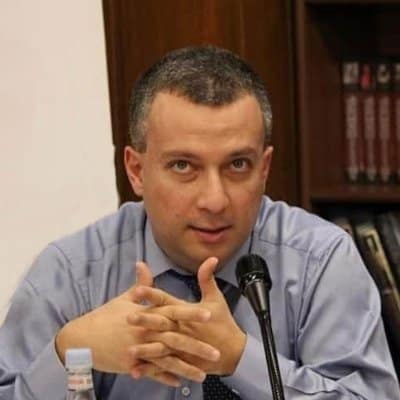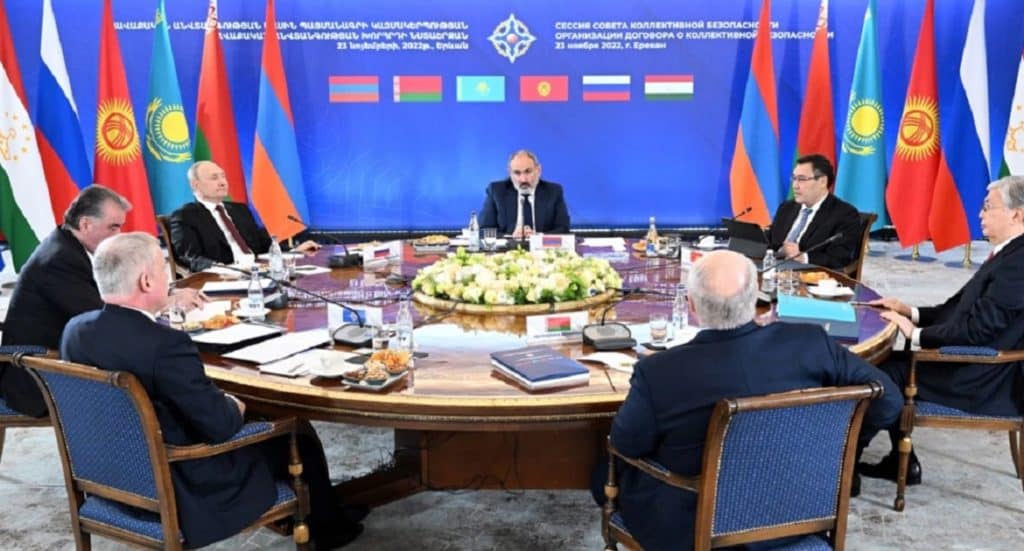World Geostrategic Insights interview with Benyamin Poghosyan on the rise of anti-Russian sentiments among Armenians, the importance of Armenia in Russian geopolitics, and the perspectives of the Collective Security Treaty Organization (CSTO).

Dr. Benyamin Poghosyan is the founder and president of the Center for Strategic Political and Economic Studies, Yerevan, Armenia. He was former vice president for research-head of the Institute for National Strategic Studies at the National Defense Research University in Armenia. His research focuses on the geopolitics of the South Caucasus and the Middle East, U.S.-Russian relations and their implications for the region, and China’s Belt and Road Initiative.
Q1 – Hundreds of Armenians protested the visit of Russian President Vladimir Putin, who arrived in Yerevan for the Nov. 23 summit of the Collective Security Treaty Organization (CSTO). The protesters criticized Armenia’s membership in the CSTO and its alliance with Russia in general, arguing that both the organization and Moscow have proven useless in the recent conflict with Azerbaijan. Certainly the street demonstration was not impressive. However, data for 2022 from the Caucasus Barometer, an annual poll conducted by the think tank Caucasus Research Resource Center, reveal that only 35 percent of respondents consider Russia to be Armenia’s main ally, down 22 points from 2019 and down 48 points from 2013, when 83 percent of respondents saw Russia as Armenia’s most valuable country. What is your opinion? Is there a major decline in popular support for Moscow among political elites and, particularly, the Armenian population?
A1 – The 2020 Nagorno Karabakh war has significantly damaged Russia’s image among the Armenian population. Many in Armenia strongly believed Russia would not allow direct Turkish involvement in a potential Azerbaijan war against Armenia. Armenians knew that Russian and CSTO security guarantees did not cover Nagorno Karabakh. However, there was an understanding that Armenia could resist Azerbaijani aggression, but Yerevan needed Russia to prevent Turkish involvement. The weak response by Russia to direct Turkish involvement in the war has triggered disappointment and anger against Russia.
Meanwhile, Russia and CSTO failed to respond to Azerbaijani’s direct attacks against Armenia in May, November 2021, and September 2022. As a result of three incursions, Azerbaijan occupied up to 200 square km of Armenian territory, but as I mentioned, Russia and CSTO failed to provide military support to Armenia. All these developments resulted in a significant rise of anti-Russian sentiments among the population. As for the political elite, the ruling party of Armenia, “Civic Contract,” seeks to keep a balance between Russia and the West, despite growing anti-Russian sentiments. The Parliamentary opposition, led by the second and third Presidents of Armenia, has pro-Russian views. In contrast, a significant part of the non-parliamentary opposition has anti-Russian and Pro-West sentiments, calling for the Armenian government to withdraw from the CSTO.
Q2 – The war in Ukraine could force Russia to scale back its engagement in other crises in the region, with potentially heavy implications for Russia’s historic role as regional hegemon and security provider in the South Caucasus. Faced with the September outbreak of hostilities between Armenia and Azerbaijan, Moscow, made it clear from the outset that it would not take sides in this new escalation, avoiding expressing direct support for Armenia and urging both sides to “show restraint.” For Yerevan, Russia remains the indispensable interlocutor, meanwhile Moscow regards Armenia mainly as a “close friend and strategic ally.” In your opinion, how important is Armenia in Russian geopolitics?
A2 – The war in Ukraine consumes Russian attention and resources. Amidst the growing Russia – West confrontation and the re-emergence of the iron curtain, Russia needs Turkey as a route for import/export operations and Azerbaijan to access Iran. However, Russia understands that Turkey is and will strategically remain the US ally and will undermine Russian interests in the South Caucasus, Central Asia, and the Middle east. Russia does not want to see Turkish dominance in the South Caucasus, and Russia understands that Armenia is the only state which may support Russian interests in the region.
However, as the war continues in Ukraine, Russia will do everything to avoid any military clash with Azerbaijan. It will transform Azerbaijan into another Georgia for Russia and ruin Russia – Turkey relations, potentially opening a second front for Russia. Azerbaijan and Turkey understand this very well, and they increase pressure on Armenia, seeking to force Yerevan to accept all their demands.
Q3 – Armenia ends its fourteen-month presidency of the CSTO to make way for Belarus. The military organization, established in 1992, brings together Russia, Armenia, Belarus, Kazakhstan, Kyrgyzstan and Tajikistan. CSTO is an organization that should ensure stability in the Caucasus and Central Asian region, and also allow Moscow to continue its influence in the post-Soviet space. However, some doubts arise about the compactness of this organization. CSTO has proven essentially unable or unwilling to support Armenia in the conflict with Azerbaijan. Two members, Tajikistan and Kyrgyzstan have clashed militarily over border disputes five times since January 2022. Putin has received rather cold responses from other members of the organization regarding support for his military intervention in Ukraine, and Kazakhstan has also explicitly distanced itself from the Russian position on the war. What is your opinion? How do you see the future of this organization?
A3 – Much depends on the outcome of the Russia – West confrontation. Every CSTO member views its membership in the organization through the lens of bilateral relations with Russia. They are members of CSTO because Russia is a member of CSTO and because Russia wants CSTO to continue to function. Thus, if Russia loses its current confrontation with the West and loses its influence and power in the post-soviet space, other CSTO member states may withdraw from the organization, and CSTO may stop to exist.
From the Armenian perspective, Armenia has moral and legal grounds to leave CSTO or freeze its membership. However, we understand that in the current situation, such a step by Armenia will be immediately used by the US for propaganda. The US will say that due to the strategic mistakes of President Putin in Ukraine, Russia is weakened and now even the Russian military alliance is unraveling. Russia will view Armenia’s withdrawal from the CSTO as non – friendly action. It will significantly deteriorate Russia – Armenia relations, adding Russia to the list of non-friendly states of Armenia, along with Azerbaijan and Turkey. This development may have catastrophic implications for Armenia, which now is under constant threat from Azerbaijan for another large-scale war.
Dr. Benyamin Poghosyan – Founder and president of the Center for Strategic Political and Economic Studies, Yerevan, Armenia.







